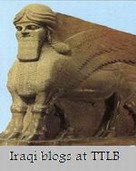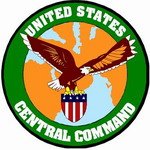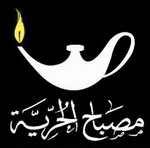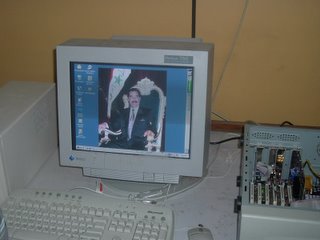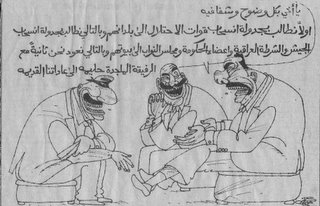
Wednesday, November 30, 2005
Want to know which Iraqi party shares more political views with you?
| It’s kind of possible now, this website offers an interesting interactive “Electionnaire” that will ask you 25 questions on the top political topics in Iraq. You answers will be compared to the answers of 10 top Iraqi parties and will give you in percentage which party you have more in common with. Ironically, four of us (Mohammed, I and a couple of friends; 2 Arab Sunnis, two Arab Sheat) took the test and in all cases we found that the closest party to our thinking was either the PUK or the KDP, the two major Kurdish parties while the INA of Allawi came second or third. By the way, the test is available in three languages, English, Arabic and Kurdish. |
Tuesday, November 29, 2005
Awaiting the elections with worries, dreams and hope...
| Baghdad looks almost like one huge billboard now that one can easily get distracted by them from his original destination! As to drivers, these posters can cause serious troubles if a driver wanted to read each one (or set) of them while driving. The noticed poster event today was that the United Alliance has begun to use the Ayatollah’s and other religious symbols in their posters again although they were instructed not to do that by other parties. However, this time they didn’t claim their list to be blessed by the clergy instead they described the Alliance’s candidates as the “soldiers of the clergy”. Naturally, the war of tearing posters or pasting other posters over them is getting more pronounced especially under the cover of night. Sadly, violence keeps happening with the assassination of Ayad al-Izzi a prominent member of the Islamic Party. Izzi was assassinated in Amiriyat al-Fallujah, a town that lies between Baghdad and Fallujah and has a population that is almost entirely Sunni and has a history of many attacks against coalition troops and Iraqi troops and officials. The locations indicates that the assassination was an act of revenge carried out by Sunni insurgents or probably al-Qaeda and so far the Islamic Party hasn’t accused anyone in the government or the Sheat militias of being responsible for the attack. In another act of violence, Allawi’s list lost another campaign worker in Hilla. It’s worth mentioning that two other workers were killed in Sadr city last week. Allawi has voiced his condemnation and concerns and demanded investigations. The Baghdad paper that speaks for Allawi’s INA party reported that several memos have been sent to the IECI regarding these incidents and added that Allawi has met the UN envoy to Iraq Ashraf Qazi and Abdul Hussein al-Hindawi the head of the IECI to discuss the measures that can prevent the occurrence of more electoral violations. On the other hand, the Kurdish papers today brought a wave of criticism and attacks on Laith Kubba the spokesman of PM Jafari who recently accused the Kurds of taking a greater portion of Iraq’s resources than they actually deserve. According to al-Ittihad paper that speaks for the PUK of Talbani, the spokesman of the Kurdistan regional government described Kubba’s allegations as “lies that lack legal support and aimed at destroying the reputation of the Kurdish leadership”. At the same time, the public opinion in Iraq seems to view the December elections as a gate towards having a truly representative government and the turnout is expected to surpass that of the January elections or the constitutional referendum. I recall that two weeks ago, we expected that the Iraqi Alliance would assume a change in strategy and according to an interview published on al-Sabah this morning, we weren’t wrong in our expectation; Nadeem al-Jabiri the head of the Fadheela Party (one of the 4 major components of the alliance) said in the interview that their goal is to achieve at least 1/3 of the seats of the Parliament as that would grant them the ability to block any alliance between other blocs. The people in the Alliance realize very well that their chances to lead a government are getting smaller but they’re still in a state of denial, as one can conclude from al-Jabiri’s words “We have put in our plans that the Alliance shall win at least 1/3 of the seats so that no government can be formed without the Alliance…”. I’d call is a dream rather than a plan because the other two major blocs that are most likely to be part of a government which are Allawi’s and the Kurds seem more inclined to unite among themselves after the elections to form the government rather than to keep power in the hands of the United Alliance. None of this is for sure as of now but the recent friendly meetings between Allawi and the Kurdish leaders like the latest with Barzani makes one think that if these two blocs get enough votes, then the United Alliance will have no choice but to become the opposition. There remains one big concern that is fraud and manipulation or intimidation of voters. These things-unfortunately-happen in almost any election process with varying levels and it would be naïve to claim that there was no fraud or intimidation back in January but we weren’t that worried about that then since the government was going to rule for only 6 months. This time the elections are about electing a government that will stay for four years, and this government will literally decide the direction where new Iraq will be heading. The international community has to rise up to the level of the responsibility this time and has some guts to be actively involved in monitoring the elections…well, that’s if the world really cares about peace and democracy in this country. Anyway, I am still optimistic about the future and although I do not think the next election alone can fulfill our ambitions but our people and our democracy matures a little more with every step like this. |
Monday, November 28, 2005
The trial...again.
Saturday, November 26, 2005
The way to the parliament: fighting with posters and sometimes bullets.
| As election day approaches close, electoral campaigning intensifies as well, these campaigns are taking several forms and unfortunately this includes violence which we were hoping we wouldn’t have to see emerge among the competing parties. Probably the worst case of violence was the one when militia men attacked an office of the communist party (running as part of Allawi’s list) in Sdar city during an electoral event and resulted in killing two of the party members. The incident is being strongly condemned and the accusation fingers are pointing at Sadr militia since they are the only militia in Sdar city and the government is supposed to take firmer actions against the perpetrators but it seems the government still wants to lose more of its credibility and reputation. On the other hand, a war of words and speeches is growing among the different parties and candidates and two points issues to be taking more attention here, these are corruption accusations and the recurrence of former Ba’ath members in some lists. Some candidates, namely Laith Kubba pointed out that he has “political bombs” regarding the above issues that will be revealed soon. Kubba who leads his own list has also challenged Ahmed Chalabi for an electoral debate. However, people in the street think that candidates should focus more on their political platforms rather than on exchanging accusations and allegations. The other battlefield of electoral campaigns can be seen in the posters war. Tearing posters of other parties has become so common that there are specialized contractors who get paid to do this! And they either tear the posters or paste their client’s poster over them. One man who works in this field said to me “there are no more walls left in Baghdad and we had to buy a new set of tall ladders in order to reach the highest spots possible…” while a taxi driver felt sorry for the “money being wasted on these posters” and added “if they used this money to offer free clothes to the poor in this winter I’d give them my vote”. Aside from what parties put on their posters or say in the speeches they make, the people themselves are also using a portion of the walls to write whatever they like with or against this or that list; one funny line I saw yesterday said something that translates like this: Vote for Allawi and your wife will buy malawi (heavy bracelets of gold) and vote for the I’tilaf (the united alliance) and you’ll go back to the tlath-talaf (3,000 in reference to the old poor salaries that Saddam paid us). Civil society organizations have their role too; the most significant initiative came from a new network of 90 NGOs who call themselves “Iraq Without Violence”. This network recruited 1,000 volunteers to watch and report for any violent incidents during electoral campaigns. The network in a statement given to al-Sabah explained that they’ll work to “prevent and expose electoral corruption, fraud and violence and that includes terrorizing voters in any way or interference with voters’ choices even when the case is domestic like when a husband forces his wife to vote for any particular candidate or prevents her from voting at all”. I really hope the process goes on without more violence or bullets and they keep their war within the lines of posters and words. |
| Sooni photoblogs the graduation ceremony of units from the Iraqi Security Keeping forces`(note the new armored vehicles). |
Friday, November 25, 2005
Announcing a contest!
| Don’t you think this blog needs a real banner in the title area and possibly a nice logo too? Well if you think you can design that sort of things consider yourself invited to this design contest! Submit your suggested banner/logo to me by email within the next three weeks, Mohammed and I will check the suggested designs and pick five of them which will be then displayed on the blog for nomination by you and the design that gets the highest number of your votes will be adopted and placed at the top of this blog. Please keep in mind that the design will need to include the phrase “Iraq The Model” it and it is preferred to choose colors that harmonize with the current colors of the blog. The best design award will be: 1-A big round of applause. 2-A HUGE Thank You from me and Mohammed. 3-Drinks and dinner in the finest Baghdad restaurant when the winner makes her/his first visit to Baghdad. |
Thursday, November 24, 2005
With all transperancy and clarity brother...
The new election law.
| We received several e mails from readers inquiring about the laws that are going to be used in the December elections and whether these laws have changed from what was used back in January or not. So, here I’ll share the little information I know in this regard. As you all know, Iraq was considered as one electoral circle in the last elections but this time it will be different; each 100,000 citizens will have one representative in the parliament and Iraq will be divided into 18 electoral circles (see numbers below), i.e. each province will constitute one circle and a certain number of seats will be allocated to each province/circle according to its population count. These 18 circles collectively will make up 230 of the 275 seats of the parliament while the remaining 45 seats are going to be allocated to what is now known as the compensatory national circle. This national circle was made to serve voters living outside Iraq since their votes cannot be related to particular provinces. This list will also serve two other purposes: Suppose 100,000 votes were counted in a province and the province has 10 seats allocated to it, this way any party running for office from this province will require 10,000 votes to get one seat. If this party won 22,000 votes, the party will get 2 seats from the province’s share and the 2,000 remaining votes will be added up to other remaining votes won by this party in other provinces (if running in more than 1 province). So 2,000 remaining from this province and for example 1,500 from another and 3,000 from another one will all be added together and if they reach the total required for one seat in the nationwide standard, the party will get one seat in the compensatory national circle in addition to what it originally won in the provinces it was running from. Smaller parties and ethnic or religious minorities are the ones supposed to benefit more from this mechanism and actually this rule was designed to protect such parties and minorities from losing their votes as this rule will favor ethnic and religious minorities over majorities when counting votes and distributing seats. In January elections, any party that won less than 30,000 votes didn’t get a seat in the National Assembly and the votes lost by smaller parties were redirected to the winning blocs based on their rank, so the United Alliance, Kurdish Allaince and Allawi’s bloc won many extra seats from votes that were not originally given to them! The 230 seats will be distributed as follows: Baghdad: 59 seats Mousil: 19 seats Basra: 16 seats Sulaymaniya: 15 seats Erbil: 13 seats Dhi Qar: 12 seats Hilla: 11 seats Diyala: 10 seats Anbar: 9 seats Kirkuk: 9 seats Kut: 8 seats Tikrit: 8 seats Diwaniyya: 8 seats Najaf: 8 seats Duhok: 7 seats Missan: 7 seats Kerbala: 6 seats Muthanna: 5 seats Total: 230 seats |
Tuesday, November 22, 2005
Are we going to see a timetable?
| Iraqi leaders, politicians and Sunni clerics agreed on asking the US to define a timetable for pulling the troops, this is all over the news websites so I’m not going to add further details here but I’d like to discuss the development with you. No government in this world acts 100% independently and there are always internal and/or external factors and pressures that affect the decisions of any given government. That’s why I think that Iraqi officials wouldn’t have agreed to the opposition’s demands if not for pressure from the US administration and I have a strong feeling that the US will announce a timetable for withdrawing the troops soon. I think the US administration kind of drove the Sunni insurgency leaders to ask for this in a way that allowed the Iraqi and US government the chance to win a good deal of time while they can reach a reasonable progress in building Iraq’s army and police forces. Everyone wants to see an end for violence but this violence comes from more than one group of fighters; one (al-Qaeda) can be dealt with only by military means but what about the other two? The local Islamic extremists, tribal fighters and former Ba’athists are also tired of fighting and they do want the power they lost (at least some of it) back and they had realized that there’s no way to do that with violence but they kept carrying out attacks as a way to voice their demands and to pressurize the US and Iraqi government to respond positively. On the other hand, Iraqi and American governments kept saying that putting a timetable for pulling the troops (let alone an immediate step) would empower the terrorists and thus was considered a redline for a long time but now things have changed; Sunni insurgents and the factions that support them are saying that they are going to join the political process and they’re ready to stop targeting Iraqis if a timetable was defined and if their right to “resist” was recognized. Now, I don’t agree at all with legitimizing attacks on coalition troops but does legitimizing or illegitimating them make a difference in the on the ground situation? They have been attacking the troops for two and a half years and they will keep doing so whether we like or not…BUT, now Iraqi insurgents will not be able to justify or adopt an attack against Iraqi civilians and incase they do so in the future, they and their representatives and supporters will lose their bargaining power because it would be them who violated the agreement, not the government. Add to this that a period of cease-fire among Iraqis can possibly accelerate the reconstruction of the country and its security forces and this will consequently reflect on the size and number of missions required from the foreign troops. People like clerics in the Association of Muslim scholars now feel triumphant that they could extract recognition of the “resistance” from the government and now they feel they do have a weight in the country’s political situation and are being treated as equals more or less. The latest change in the US administration’s tone as of this issue makes me think a timetable will see the light soon, a day or two ago, Mr. Rumsfeld said that this is a technical issue and that generals and commanders of US forces are more able to decide whether it is possible to reduce troops count or not. This means that it is not considered a political decision anymore, at least not as was used to be a year ago. On the other hand, Mr. Cheney lately reduced the redline for US involvement in Iraq from timetable to immediate withdrawal and insisted that an immediate action to pull troops would be a grave mistake but he didn’t mention a timetable in an attempt to divert attention from the former redline. (Sorry for not including links, these are yesterday's news stories and I couldn't locate the links tonight). I could be wrong in my speculations but I think the right time to start negotiating the timetable between the US and Iraq will be after the formation of the new government that is to be elected next month; this government will certainly be a true representative of the people and will have the full authority of a government that will last for 4 years. If this moves as I’m expecting here, we will deal a powerful blow to foreign terrorism and to dictatorships in the neighborhood that want to destroy Iraq. Giving everyone the chance to have their say under the law will certainly isolate terrorism and consequently reduce its power but not ending it. |
Monday, November 21, 2005
On the Cairo conference and its final statement...
| The preparatory Cairo conference for reconciliation ended with a final statement that came at the last minutes after there were doubts an agreement on one could be reached if not for the Arabic language that is pretty good at twisting and playing on the meanings of texts. The conference itself is viewed as an accomplishment for the Arab League let alone reaching a final statement that satisfied all parties without much troubles. In my opinion, the Iraqi parties had originally joined the meeting to show that they’re not against a national reconciliation or against what can solve the crisis in Iraq. Of course this does not apply to all the parties as with the presence of extreme trends on both ends of the spectrum, it was natural that a middle trend will emerge to approximate the extremes and this middle trend was born in Iraq and found its place in this conference and tried to deter the rivals from marginalizing each other in order to find a middle way. The statement was decorated with a call to put a timetable for foreign troops withdrawal and this part was the focus of the talks while it is a quite technical issue that cannot be solved by Iraqi politicians as the final word will be in the hands of the elected government that is yet to come and this is the only entity that will have the right to speak on behalf of the Iraqi people. We heard a similar sort of talks prior to January elections and many parties held the slogan of ending “the occupation” but after the elected representatives sat to figure out what to do most of them found that asking the troops to leave would be in no one’s interest so they found themselves asking the UN to let the troops stay for another couple of years instead of asking them to leave. Again, this issue is a technical one and speeches mean almost nothing and I’m positive that whoever is to be elected next month will realize the complexity of the situation especially when it comes to building Iraqi forces capable of preserving security. Some try to overlook regional and international balances and forget that Iraq is part of these balances and they even try to ignore the resolutions of the UN and Security Council forgetting that they also are part of this system which they’re going to rely on for one thing or another sooner or later. What we actually need is to encourage the reasonable middle trend that weighs things by interests and logic, not emotions and mood and does not use a use that boring poetic language when discussing a technical task. Anyway, I think this conference is going to change very little from the situation on the ground; those who endorse and practice violence do not really seek legitimacy from this or that conference. But there are still a few good things that came out of this meeting as this is the first time since the fall of the past regime when the Arab League denounces Saddam’s regime opening the door for discrediting more dictatorships in the future. Second there was a condemnation for media networks that were asked to lower their tone a bit and to stop saying things that might create hatred or encourage sectarian or ethnic differences and this call addressed both, Arabic and Iraqi media that is serving certain partisan interests. Other than the above, nothing is worth mentioning and I feel that this conference isn’t going to make tomorrow different from yesterday. I trust elections way more that I trust such events sponsored by a dying league. If we want to improve our conditions then we (Iraqis) must first think well before making our choice this time. I say it again, those who claim they speak for all or most Iraqis and that troops withdrawal is a public demand should enter the election and wait for the results and when he wins, then he will have the right to say so because only then, he would be representing the people. |
Sunday, November 20, 2005
Zarqawi probably killed!
| According to these two sources, Iraqi and US military forces in Mosul think that Zarqawi, al-Qaeda leader in Iraq was possibly killed in a raid on a house where members of al-Qaeda were holding a meeting. Al-Mada paper said that terrorists hiding in a house fired back at American and Iraqi troops that were surrounding the house in a battle that lasted from dawn to noon on Saturday (Jerusalem Post said it was Sunday)`after receiving intelligence about a meeting for senior al-Qaeda members. The terrorists blew up the house when an Iraqi assault team tried to break into the house, the blast killed four Iraqi soldiers and wounded ten policemen and also killed all of the hiding terrorists. Eight charred bodies were found in the scene, one of them belongs to a woman. An Iraqi security official in Mosul said that US forces will most likely conduct DNA tests on the found bodies to verify whether or not Abu Musaab al-Zarqawi was among the killed terrorists. If anyone has more information on this news, please leave a note in the comments. Update: In this Yahoo News piece, a US counterterrorism official in Washington confirms that investigations are underway to find out if Zarqawi is among the dead . |
Saturday, November 19, 2005
The Cairo conference...
| The reconciliation conference in Cairo started today with an open session where opening speeches were made by Amr Mousa, president Mubarak, president Talibani, PM Jafari, Humam Hammodi (on behalf of the SCIRI) and Harith Al-Dhari (on behalf of the association of Muslim scholars) this was followed by a break and then followed by a another session where no media were allowed. What characterized the speeches made in the first session was that they were competitive and everyone was sticking to their usual attitudes and positions and didn’t show the tone of people who wanted to meet at the middle or abolish their differences. The news came later that Kurdish and Sheat leaders left the second session after being “insulted” according to Jawad al-Maliki of the Dawa Party. However the currently available reports didn't who "insulted" the angry leaders but al-Arabiya reporter explained that it was the delegate of the Assyrian Party who said something that offended the Kurdish and Sheat politicians. This was a not confirmed by another source yet but if proven to be true, it will be a surprise! The key points of differences were the issue of the Ba’ath party and the “armed resistance”. Al-Dhari unsurprisingly demanded the government to recognize the armed resistance which he described as a “legitimate right for all occupied peoples”. He also demanded ending what he called the “marginalization of certain factions” which is a clear reference to the deba’athification policy. Finally he insisted that a timetable must be put for withdrawing foreign forces from Iraq and he also mentioned the calls made by some US Democrats’ recent call for an immediate withdrawal to justify his demands. Ironically, the most extreme faction in Iraq has only demanded a timetable but not an immediate withdrawal of troops like some US politicians did! The above almost illustrates the events of the conference which is planned to last for another couple of days and I’ll try to keep posting about it if some significant development happens. |
| Two blog awards are awaiting your nominations, one is 2005 milbloggies that allows you to choose your favorite among hundreds of military blogs and the other is WizBang’s Web Log Awards 2005 where you can nominate your favorite blogs in 37 categories. |
| In a report published on al-Mada paper yesterday, the paper mentioned that there’s a printed threat being distributed in the town of Dujail and carries the signature of al-Qaeda in Iraq. The leaflet warns the residents of Dujail from testifying against Saddam in the upcoming trial on November 28 and threatens to kill the extended families of anyone who would step up to testify. I thought there was no connection between “religious” al-Qaeda and “secular” Saddam! But if that is so, then why is Zarqawi trying to defend Saddam? |
The first official car-bomb commercial I see!
| Check out this clip from Iranian TV which came to show us an example of how far hatred can go in a media controlled by a regime led by someone like Ahmedinejad whose administration is clearly and openly encouraging murder, suicide and racism. Now I don’t live in Jerusalem but I live in Baghdad and daily car-bombs had been causing endless death and suffering for us, so how are we supposed to feel about Iran when we watch such a call for mass murders? Jerusalem, Baghdad, New York or Madrid or any other city in this world; aren’t these all cities that must submit to the rule of the Imam/Caliphate in the sick ideology of the Mullahs or al-Qaeda. The world must wake up to this serious and imminent threat that seems so willing to destroy other nations. The UN’s reaction to Ahmedinejad’s threats to destroy whole nations in the region and burn anyone doesn’t agree with him was WEAK and didn’t meet the requirements of the escalating situation. I don’t what are we waiting for here! There is a regime in Iran that is so keen on developing nuclear power while throwing threats here and there. Why should we wait till something really bad happens? I mean COME ON… it’s so obvious what the Mullahs and Nejad are planning to do. |
Friday, November 18, 2005
An aggression, not a reaction.
| The scene in Iraq today was one of blood and destruction; there were large suicide attacks that targeted two Sheat mosques in Khanaqeen and al-Hamra hotel in Baghdad, a hotel mainly used by journalists. Some have tried to make this look as if it were a Sunni reaction for the scandal of Jadiriyah detention center and as an operation avenging the tortured prisoners. In fact, the torture scandal will have serious consequences on the current government and actually the members of the Sheat coalition are already shocked by Jafari’s call for investigating the incident which may end up with charges against members of his own alliance in “a test for Jafari’s credibility and integrity” as many Iraqi papers described the case. In my opinion, these attacks are not a Sunni reaction as much as it represents a continuation for the terrorists plan to provoke a civil war in Iraq because attacks against mosques are not something new and we’ve seen many of such attacks in the past two years but the torture scandal came as a motivation for carrying out more attacks and making them look like a reaction rather than an act of aggression. These attacks are obviously aiming at dragging Iraqis into a cycle of revenge and exchanged violence and that is the perpetrators’-and their allies-main objective. The countries that are backing militias on each side are working hard to pull Iraq to an endless violence and instability; Iran on one side supporting Sheat militias and Syria on the other backing Sunni fighters while regimes of the two countries are shaking hands congratulating themselves on the blood pool they created and that is keeping their thrones safe for sometime. The current government is in a very bad situation and political rivals who are looking forward to winning the elections are waging a relentless attack on the government even before the results of the investigation have not appeared yet. Many are trying to invest this scandal to serve his interests and it seems that we’re about to face a big political storm that will apparently make the coming month until the elections come a long and tough one. |
I know some who would agree with Murtha, but who?
| It’s becoming obvious now that most of the regional powers including Arab countries as well as many former Ba’ath leaders began to realize that defeating America and pro-democracy Iraqis is not a reasonable objective anymore and that’s why they are making steps to join and/or support the political process. This came in the form of lowering the ceiling of their demands from an immediate withdrawal of coalition forces to setting a timetable for the process and this is what we’re hearing from the hardcore Sunni parties and people who speak for the Iraqi militant groups and in the Arab League’s attempts to host a reconciliation meeting. The previous two and a half years lacked such moves and their appearance at this stage indicates that these opposition parties and Arab policy makers are getting tired of armed confrontation with the Iraqi and US forces since this confrontation hasn’t done them any good. Maybe the most significant recent statement in this regard is the one made by Egypt’s foreign minister when he said that US forces presence in Iraq is necessary to “stabilize the country” and warned that a civil war could erupt if these troops leave now. Such a statement lead us to the conclusion that countries like Egypt are no longer placing their money on the armed insurgency. And I really think they were forced to make this change in attitude because Iraq now is less than a month away from electing its first permanent (4 year term) government and the situation is no longer representing a temporary or transitional phenomenon but rather a solid transformation that began to take shape. However, there are still some elements that have different goals of course but they all think that they can reach these goals through pushing America to leave Iraq; I’m talking about elements like Asad, al-Qaeda and Murtha. In spite of the differences, neither is following logic and we do need to work on changing their minds (each in a different suitable way). I can’t imagine why Mr. Murtha said something like “is evident that continued military action in Iraq is not in the best interests of the United States of America, the Iraqi people or the Persian Gulf region”. It is really strange when a US representative says something like this few weeks after the elected Iraqi government demanded from the UN to extend the mission of coalition forces for another year; apparently my government (and I) do not think that US military presence is harmful for us and the Arab League also thinks that an immediate withdrawal would be disastrous for Iraq and the region. And correct me if I’m wrong but I think I heard a few days ago that the US senate rejected a law that demanded setting a timetable for troops withdrawal (58 vs. 40, right?) let alone an immediate one. However, I agree with Mr. Murtha that some people in Iraq would benefit from an immediate withdrawal but that would be al-Qaeda and there are also countries in the region that would benefit from that too but these would be Syria and Iran! |
Thursday, November 17, 2005
Democracy is the protector, not Bayan.
| Iraqis have been receiving very disturbing news about prisoners abuse in the detention centers of the interior ministry and what’s really alarming in this incident is that the bad guys weren’t masked men hiding in narrow alleys but were men in uniforms that were supposed to bring us security and peace but unfortunately it appeared to be sometimes doing the exact opposite showing us images of savagery that terrify us in the name of fighting terror. Everyone here knew some violations were taking place but only now we got to realize the magnitude and organized nature of these outrageous violations. We have expressed our concerns more than once before when the government was still being formed and there was a big conflict about who should get the interior post and we knew what those parties were aiming at and what we saw yesterday proves that their goal to take over the security instruments rather than preserving security. We all know how the SCIRI insisted that the commander of Badr brigade Hadi al-Amiri should take the post but they later settled down for Bayan Jabor and it was the internal and foreign opposition to assigning al-Amiri that helped us get the mildest of too bitter choices. Keeping an eye to prevent such atrocities is rather difficult but at least having an opposition guarantees that that when they happen, there will be people to expose them, speak out and demand justice and this incident proved that democracy and freedom of speech are the real protectors of the people and not this minister or that official. Minister Jabor appeared in a press conference today and he didn’t deny the abuse yet he said that only 7 prisoners were abused and not 173 as the news originally said and he also denied the claims that the detention center in question is run by Iranian intelligence officers saying that it is actually run by 29 “pure Iraqi” officers. However, this is not the first case of abuse that got played down by the ministry, few months ago several detainees died of suffocation after being locked up in a cargo container overnight and the ministry then managed to get away with it and investigations were soon forgotten about. Whether he was telling the truth or not this time cannot be verified immediately but there will be an investigation and the public does not seem willing to let the guilty walk away this time and the truth will hopefully be revealed. There should be no place among us for another Saddam or for Saddami ways and we cannot accept to let dungeons or basements take away our freedom again. We are not living in the dark past again to fear asking for justice; we’re in the new Iraq and those who want to steal our freedom shall get nothing but disgrace. |
Wednesday, November 16, 2005
Warning: Pajamas set loose!
| Right now in NYC, Pajamas Media…Oops! I mean Open Source Media (this is the new name) is being officially launched. I’ve recorded and sent them a short audio piece but I doubt it will be played because I was rather late in sending it. Anyway, you can listen to the whole thing by going to the live audio stream link on the new main page. |
Tuesday, November 15, 2005
The December elections: The Equation…
| Math wasn’t my favorite class in school but I do remember one thing for sure that is inorder to solve any equation it has to contain a number of variables and constants and the values of the constants will help find those of the variables leading to the final solution. Elections in Iraq can be considered an equation and the above applies to it more or less. However, here we have much more variables than constants (almost all of which have changed since last January) and this makes the equation harder to solve. Let’s consider that our main (if not only) constant is the Kurdish bloc that hasn’t undergone any major changes except for the separation of the Islamic Kurdish Party which was a relatively minor component of the bloc. Other than that, the goals, policy and areas of influence are the same and the public base remained hardly changed. On the other hand we have variables and important ones like the Sheat alliance and Allawi’s list have changed a lot recently with the former shedding some weight and the latter gaining some. We have also seen a new variable entering the equation; that is the Sunni Arabs who are definitely going to take a significant chunk of votes for their new lists. So one can easily predict from this that the results are going to differ greatly from last time, but how? Is the question. From what I hear and see on the ground I can say that the new government will see at least one major bloc bring replaced by one (or an alliance) from the current opposition. And here I’m speaking about the Sheat alliance in particular. We have noted more than once that this bloc has lost many of its previous components like Ahmed Chalabi and two other moderate/secular trends. Add to this a) the declining popularity of the SCIRI and Dawa parties and the rising complaints from the people (especially in the south and Baghdad) because of the weak performance of the government and b) there is no support from the Ayatollahs to this list so far and none is expected at all this time. Well, I guess I can add a (c) here which is that the biggest two groups in the alliance; the SCIRI and the Sadrists already have a very fragile bond between them and they technically fought each other and burned each other’s offices not long time ago! Meanwhile, Allawi (whose list won about 40 seats in January) have added more strength to his list by including the communists, ex-president Yawir and a few other smaller lists that collectively won about 10 seats in January. However, this list has the potential of winning up to 80-90 seats if more Sunnis voted for him and Yawir and if some Sheats choose to leave the SCIRI and Dawa and instead vote for Allawi who proved to be a strong leader in his 6-month term last year. The Kurds on the other hand have neither renewed their alliance with the Sheat alliance, nor declared one with Allawi but they have made clear signs that they want to ally with the winners to form a government and they would not accept anything less than a president or prime minister post for one of their politicians. Since the Kurds weren’t getting along very well with Jafari in the past few months and the tensions between Jafari and Talbani went to the degree of armed clashes between their guards and calls for resignations and because of their (the Kurds’) known inclination to ally with secular trends, I can see the new government consisting of Allawi and the Kurds and probably a secular Arab Sunni party. This will inevitably push the parties of the Sheat alliance to change their strategy from dominating the parliament and forming the government to forming the opposition and that’s why I expect then to limit their ambitions to winning the essential number of seats (1/3 of the 275 i.e. 92 seats) that grants them the veto right in the parliament so that the ruling bloc would not be able to pass any law without an agreement with the Sheat alliance bloc. There remains one variable that can not be estimated in magnitude or direction at the moment due to its complexity and because it’s a new addition to the equation, so I will leave this part to another post that will hopefully come soon. I have said before that what made me vote for the constitution was the last-minute-deal that allowed for making amendments immediately after the formation of the new parliament, unfortunately we discovered later that the procedure would require the suggested amendments to be put for voting in the parliament in one package of suggestions which if approved would later find their way to a general referendum. This way a veto from 1/3 of the parliament (that could be due to an objection on one suggested amendment) will halt the whole bill and this of course is not in the interest of the secular trends (and I was personally disappointed too) since they are the ones who have many ideas for amendments in mind unlike the religious trends that have written most of the constitution and put almost everything they wanted in it. Anyway, there’s still hope and actually there’s a good chance that if Allawi and the Kurds win the majority then the new parliament can amend the constitution in a way that meets the standards of modern constitutions that protect the rights and freedom of all citizens away from the restrictions of religion and backward thinking. |
Monday, November 14, 2005
Two Years!!
| There was no blogging yesterday and there will be none tonight as well; it’s this blog’s 2nd anniversary! Many of you had been reading our posts for whole two years now but today we want to read yours. We’re not sure if you know this, but your comments are an invaluable source of knowledge (and sometimes fun!) to us. Thanks to everyone who visited this blog and supported us throughout this journey which has been a very exciting chapter of our lives. Mohammed and Omar. |
Saturday, November 12, 2005
Sistani makes a good decision...
| In an important step towards more credible and fair elections, senior cleric Ali al-Sistani announced through his office that he will refrain from receiving any of the political leaders running for office in the next elections and will reject the many requests made by many Iraqi politicians. In my opinion, such steps constitute real support for the coming elections and a declaration on the part of the Ayatollah of his awareness of the previous mistake when politicians convinced the clergy into endorsing their lists which resulted in rendering the clergy liable for criticism from the public and affected its popularity rewarding the clergy with nothing but contempt from the people due to the poor performance of Jafari’s government. People here are cautious (I mean the liberal people) from the interference of the clergy with the elections like what happened last time and I’ve discussed with many people that the outcome of last time’s experience will make it hard for the clerics to get involved in a similar mess again and tell them that there’s no need to be afraid this time. The previous lesson they learned from the January elections and the aftermath was in my opinion enough to convince the Sheat senior clerics that they were wrong by interfering with politics while as to Sunni clerics, they will try their luck this time, apparently without making use of others’ mistakes and actually this is not something unexpected since we’re still in the early stages of learning how to accept and practice democracy and making mistakes will remain the main source of knowledge for some time. Here maybe I should refer to Salih al-Mutlaq’s separation from the main Sunni (mostly religious) list; this man has recognized that depending on sectarian emotions and affiliations isn’t going to take him and his party anywehere, I have reservations on this man though but I do encourage his choice and maybe his statement yesterday when he met Jack Straw about his interest in building a liberal state represents a positive sign to neutralizing clerics of both sects. Don’t think I’m saying that the religious factor has been totally excluded or neutralized for good but I’m trying to say that it’s being reduced in magnitude and influence and the its interference in politics will undoubtedly be less pronounced next time and this is what I believe in. As a matter of fact, we have already seen signs indicating this change in the constitutional referendum where the voters turnout in the Sheat dominated cities was relatively lower when compared with January elections and the turnout in other regions despite the clergy’s call to participate in the referendum. The coming election will certainly not be extensively governed by emotions like last time, well, at least when it comes to the Sheat, from what I hear and see here I tend to believe that voters are going to be more careful with whom to vote form. And I’d like to remind those who persist to say that Iraq is a failed case that next month we will have witnessed three democratic carnivals within only one year, on January, October and one yet to come on December and I believe this alone is a striking proof on the accomplishments of a nation that has just emerged from the horrors of 35 years of tyranny and suppression and what adds to the value of the proofs of this success is that more of the community factions have joined the march and I want to remind you also that we’re human and we do err, one elections is not enough to state whether we’re successful or not and it is dead wrong to judge a country this way; we’re moving forward and nothing can stop the progress, this something I’m damn sure of. |
Friday, November 11, 2005
The rat of clubs is dead!
| Saddam’s deputy, Izzat Ibrahim al-Douri has died. No details on the cause of death were revealed. AFP, via al-Hurra TV. 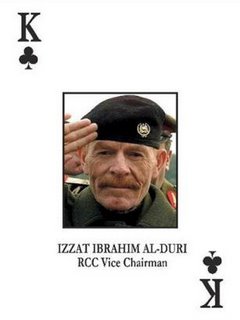 May he rot in the deepest hole of hell. |
Thursday, November 10, 2005
Egypt's parliamentary elections...
| The liberal opposition party of Egypt, al-Ghad has apparently lost in the 1st stage of the parliamentary elections. Big Pharaoh reports that Muslim Brotherhood has won a good deal of the votes too. Obviously this is not going to serve the reform movement in Egypt. Check out Sandmonkey too for news, comments and updates. |
With the number of blogs coming out of Iraq increasing day by day, it becomes increasingly difficult to keep track of all of them (don’t look at the sidebar, there are over 300 hundred more blogs out there!) but today I came across this blog by a 13 year old girl from Mosul that really impressed me with her writing style and spirt. She wrote this in the ‘about me’ section:… My school is far away from my home & the way to it is dangerous , so every day considered as a challenge. I have many dreams & ambitions, I wish that one day they become true . I want to be an engineer in the future , my mom always support me to accomplish my ambitions … optimism is my strategy always… Computer & internet are my life & what I do in my spare time , But if we don’t have electricity, I spend my spare time reading , writing, listening to music ,& doing some handmade work … I found that Blogging is a great way to express my thoughts , opinions, & feelings to the world ,to get friends & to share them my happy & sad moments…. And in a post about referendum day, she wrote: But every one has different opinion even in my family , some agreed with the new constitution & some disagreed , today I knew what the democracy mean. Yet her mother (a fellow blogger and fellow dentist) can’t feel the hope and optimism within her own household…I don’t know why is that so but I hope the mother could learn a little from the daughter. I’ve blogrolled both of them; don’t forget to check their posts. And by the way, Kurdo is back to blogging after a very long hiatus and so is Liana after a not so long vacation. |
Terror attacks in Jordan!
| The people pay for their governments' and media's denial and delusions...as simple and as sad as that. |
Wednesday, November 09, 2005
I couldn’t help but ROTFL when I read this report about the Paris riots:Faced with widespread lawlessness, some people in France have started defending their property. In Seine-Saint-Denis, a suburb of Paris rocked by several nights of unrest, a community group has started patrolling local properties armed with…. Here I was expecting shotguns, rifles or pistols to complete the sentence but then thought No, this is Europe and there must be laws against carrying firearms in public so I thought baseball bats would be the weapon of choice but again No I told myself; this is France they’re talking about and they don’t play baseball in France, so what did the community group carry to defend their property? "pepper spray and heavy flashlights" was the answer!! I don’t know how you see this but to me it feels like telling the rioters ‘come here and bring that piece of pizza, I have a pepper spray in my hand’ or ‘come and pose for a photo, I brought this excellent flashlight with me!’. Sarcasm off… I feel sorry for what’s going on in France and in particular for Paris which is a city I adore but I don’t feel sorry for French administrations that brought this upon themselves and their country with their poor immigration policies over the last decades. Unfortunately this applies to several other European countries as well. It is okay to accept refugees and immigrants and provide them with shelter and jobs but these people must follow the laws of their new place and respect its culture just like they want to have their own cultures respected and they must not be allowed to change the shape of the host country. I’m not sure I can write this and make sense but I believe that European governments and large parts of the natives there failed to distinguish between oppressed people and wanted fascist extremists who fled their native countries; the first group fled their original countries looking for a better place where they can live a real life and grant their children a chance for a better future and they do deserve to be given the opportunity to do this in a place other than their dictators-ruled countries while the latter; well, they want to take over in any place they happen to exist in and they want to impose their vision on others without the least respect for their hosts. If things continue to move the way they’re doing now, I’m afraid Europe will wake up some day to find itself infested with extremism to a degree that could possibly surpass what we see in many of today’s Muslim countries. |
If you haven’t read this interview yet, I encourage you to do so; it marks at least one key change in the way war in western Iraq against terrorists is being fought:Col Davis: Husaybah has been cleared and secured. Coalition forces are now conducting combat patrols. Construction is underway for basing of Iraqi and U.S. troops to maintain a permanent presence in the city, and provide security. We had a real good plan, but the execution was even better. I am pleased with the results of Operation Steel Curtain. This is something we needed to hear for a long time now and I believe that maintaining permanent presence along the routes used by terrorists to get to major cities will make it much easier in the future to restrict the movement of foreign suicide bombers and prevent many of them from reaching the cities. It is obvious that securing a big town or a city from within the city itself is a very difficult task but securing a number of villages and smaller towns many kilometers apart one at a time can be a lot more practical and will eventually cut the routes used to move men and weapons to the rest of the country. |
Monday, November 07, 2005
With less than 40 days to the next elections...
| Political parties and alliances launched their campaigns to prepare themselves for the December elections; they’re marketing their programs and policies in a way that is considerably different from what we experienced a year ago and entirely different from what we had for decades under the Ba’ath despotic rule. Now we have more than a few platforms to choose from and not the one and only “central report of the national conference of the Ba’ath party” which used to poetically illustrate the Party’s totalitarian vision for the Arab nation and we had the right to choose then too but it was more like "take this or have your head taken"! While now we see politicians seeking voters’ acceptance, each one of them building his strategy on what he believes appeals to the mainstream opinion. A few days ago, the united alliance (the religious Sheat slate) revealed its platform which has the formation of the federal south as its core theme. The idea and the expected benefits were emphasized by Abdul Aziz al-Hakeem during a press conference last week. This shows a will on the part of the SCIRI and allies to form an Iran-like state in the southern provinces of Iraq. This, even if not publicly stated but shows clear from the exclusively religious composition of this alliance after moderate/liberal elements like Chalabi, Bahril Iloom (the oil minster) and Ali al-Dabbagh departed the alliance and are now going to enter the election in separate slates. At the same time, the Sadr trend-which is now the 2nd biggest component of the Sheat alliance after the SCIRI-based their campaign on the issue of ending the presence of “occupation forces”, reactivating the deba’athification process and halting any attempt to build peace with the “Zionist entity” without a word about the federal state idea endorsed by the SCIRI. Moreover, some Sadr spokesmen occasionally continue to criticize the new constitution and its writers, perhaps they forgot that it was their allies in the SCIRI and Dawa who had the biggest role in writing the draft! So, apparently the united alliance is not in its best shape nowadays and this is evident from the lack of harmony between the major elements and the widely differing declared policies and goals, actually there’s one incident that became a joke in the streets; the spokesman of Fadheela party said when he announced that the party joined the alliance “We were planning to enter in a separate list but since the deadline was yesterday, we decided-with reservations-to go back to the united alliance”!! The joke here goes like “is this an invitation to elect them with reservations??”. The reputation of the alliance is being further damaged by reports of campaign posters of secular parties like Mithal’s Allawi’s and Chalabi’s being torn off the walls in cities like Najaf and Kerbala where followers of Sadr and the SCIRI predominate. This of course is against the regulations of the IECI and it won’t be a surprise if we hear soon about charges raised against the alliance. On the other hand, the Iraqi Nation Party of Mithal al-Alusi which has been gaining more interest from the people here has announced their campaign which focuses mainly on improving the food rations system and eradicating terrorism and corruption; words that are not uncommon but the determined character of the man who said them makes one inclined to believe he means what he said and while I don’t think the food rations system is a good way of improving the life of Iraqis, I think if this man and his party reach offices they will most likely change the balance in Iraq’s war against terror and corruption. Allawi’s team has also outlined their intended policy for the next four years which can be found in Arabic on New Sabah in a quite lengthy piece that included Allawi’s plans for so many issues but security and rebuilding the armed forces took nearly half of the document, anyway I’ll try to discuss this further in another post. What I wanted to say is that, according to the current findings and observations, I think that next government will be formed from two blocs at least and maybe three or even four but there will be also a more pronounced and active opposition inside the parliament unlike what we have now because this time I expect to see a wider variety of trends and opinions with more small-to-mid-sized blocs winning several seats in the parliament and this will prevent the monopoly of decision making and eventually people will no longer feel they're being unjustly silenced or marginalized. |
Sunday, November 06, 2005
| Egyptian, Libyan and Iranian bloggers are spending time in jail as a punishment for words they have written on their blogs. Committee to protect bloggers has more details as well as links to petitions you can sign. Meanwhile, I have found contact information for Egyptian embassies in some countries, you can do your part and call or (at least e mail) them and demand they free the imprisoned blogger. United States: Phone (202) 895 5400 Email: embassy@egyptembdc.org Canada: Tel. (613) 234 4931 Email: egyptemb@sympatico.ca Ambassador: egypt4931@rogers.com United Kingdom: Tel: 020 7499 3304 Australia: Tel: (61 2) 273 4437, 6273 4438 info@egypt.org.au |
Saturday, November 05, 2005
| I’ve been facing continuous problems with my internet connection in the past few days and I expect this to last for another couple of days, so excuse the light blogging. The good thing is that such blackouts are temporary while the service is usually reliable and steady most of the time, unlike what Michael Totten experienced in his Middle East journey so far! Anyway, I’m seeking alternative methods to connect to the internet in case my default connection dies and I found one method that sounds good; one of Iraq’s three cell phone operators Asia Cell has introduced a GPRS service through which anyone can get on the web either directly through a cell phone or through a PCMCI modem plugged into a laptop. I have purchased their sim card and all I need now is to order the modem and then I’ll be able to get a connection anywhere in four provinces (so far) these are Baghdad, Kirkuk, Mosul and Sulaymaniya. This service is costly though, 1 $ per each 1 MB of data transfer but still it makes a good backup plan for emergencies! Until later I leave you with two things to check out; first, I did a profile interview for Norman Geras which you can find here and the second (which you shouldn’t miss) is Sooni’s photoblogging of the Eid in Baghdad. Here are two of the photos he posted and you can see many more if you click the link above. 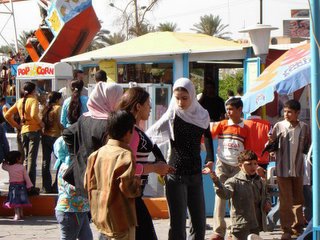 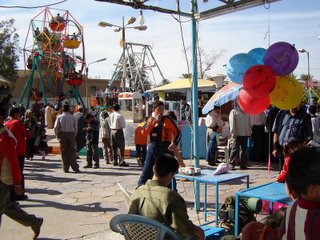 HAPPY EID EVERYONE! Update: More beautiful Eid photos from Iraq, this time brought to us by al-Dhafer blog from Samawa city. When coalition forces raid a house used by terrorists it becomes the big news of the day and is consistently used to show Iraq as a hole of hell but when coalition forces help Iraqis build an amusement park that serves a city with population of over 500,000 so that families can spend a good time, no one talks about it…thanks to blogs! 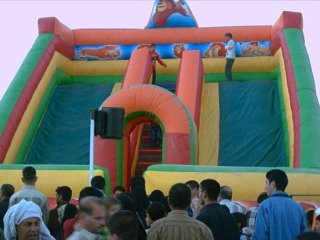 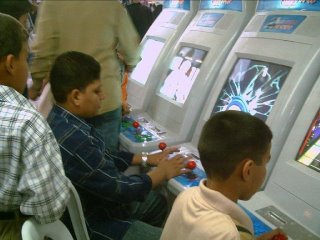 More here. I’ve been following the progress of building this park for some time. Gladly it opened before the Eid so that people could enjoy it! Here are some photos from August: 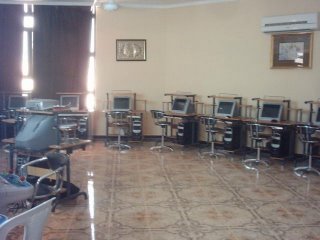 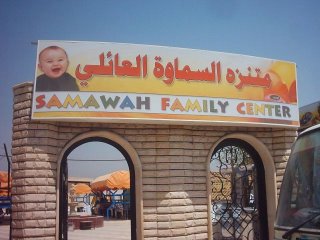 And more here. |
Wednesday, November 02, 2005
| In a press conference this morning, Ahmed Chalabi revealed the components of his new bloc with which he’s entering the upcoming election in December after he left the National Alliance. He also seized the chance to announce his slate’s platform which of course included many not unexpected ideas like promises to fighting terrorism, creating more jobs and rebuilding the infrastructure which are common findings in almost all recent speeches of politicians but the most interesting plans he talked about was introducing an oil revenue distribution plan similar to that currently used in Alaska with one difference that is money is to be distributed monthly instead of annually. I have doubts about the feasibility of such a system in Iraq, I think it can be a good alternative for subsidizing fuel and food rations, maybe in a few years from now but not at the moment (I will probably write in detail about this in a separate post). The other significant statement he made came when he described his bloc as “a choice for Iraqi voters who do not want Iraq to become a theocracy…” This makes one think that his separation from the National Alliance was not a political tactical maneuver like some observers suggested but more likely the result of a conflict of interests. A positive change is noticeable even from the early days of the campaigns of competing parties and politicians (religious and secular) and it shows clearly in the speeches they’re making on TV; there’s more talking about plans and strategies than about sentiments and emotion-targeting slogans which dominated their campaigns before the January elections. It is true their ways of presenting their platforms are still superficial and underdeveloped but it marks a change in the way politicians speak to voters. |
| This interesting post from Lebanese Political Journal was e mailed to me this morning and I’m damn glad I received it because it spared me the effort and time of composing a post about several ideas I had in my mind for some time, yet didn’t have the time, couldn’t find a way to organize or forgot for one reason or another to write about. I might disagree with the author on a few little things but the post in general is certainly worth reading. |
| I received a grate e mail from an American soldier who has been serving in Iraq for nearly a year and is now preparing to go home after finishing his tour. He sent me a copy of the latest edition of a weekly newsletter he writes from Iraq with lots of stories about reconstruction, humanitarian aid and friendship. I really wish I could know about this rich source of information earlier, anyway, you can find the latest letter as well as the archived ones in this blog. |
| I’d like to introduce to you a new and interesting blog about Iraq; Pearls of Iraq. Actually it’s not that new; it’s about two months old now. It is written by an American-Kurdish-Muslim who carries a Master’s degree in International service (Islamic approach to dialogue and peace- building and Kurdish studies). In her latest post she brings suggestions about what to do with the unfinished mosque I mentioned a couple of days ago. |




